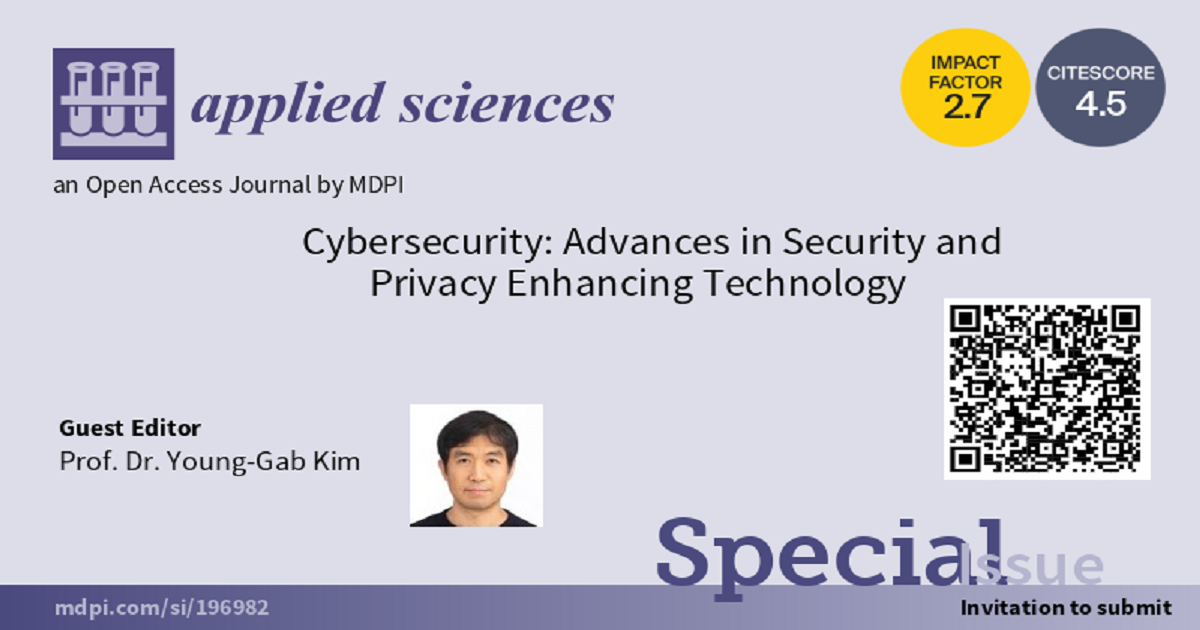Cybersecurity: Advances in Security and Privacy Enhancing Technology
A special issue of Applied Sciences (ISSN 2076-3417). This special issue belongs to the section "Computing and Artificial Intelligence".
Deadline for manuscript submissions: 20 May 2026 | Viewed by 5566

Special Issue Editor
Interests: Internet of Things (IoT); security; AI-based video security; interoperability
Special Issues, Collections and Topics in MDPI journals
Special Issue Information
Dear Colleagues,
Cybersecurity is the technology of protecting networks, systems, and data from cyberattacks. These cyberattacks aim to gain unauthorized access to networks, systems, and data and cause damage such as changing, destroying, or stealing sensitive data in the systems. Therefore, cybersecurity should provide various measures, methods, and solutions to protect users and systems from diverse threats and vulnerabilities. To minimize the risks of cybersecurity, we can consider many aspects. For instance, we can follow the security-by-design architecture, in which all products (e.g., software, hardware, and network) and services can be designed and implemented to ensure that the key security properties (i.e., confidentiality, availability, integrity, authentication, and accountability) and privacy issues are maintained properly in all phases of development and maintenance. This Special Issue (SI) aims to identify the security and privacy-enhancing technologies for cybersecurity. We invite submissions in theoretical and experimental studies, as well as comprehensive review and survey papers.
Topics of primary interest include, but are not limited to, the following:
- Advanced fine-grained authentication and dynamic access control for cybersecurity;
- Pseudonymization and encryption for cybersecurity;
- The automated, flexible, encrypted control of data access;
- Privacy-enhancing technology (PET) for cybersecurity;
- Privacy strategies for sensitive information;
- Security and privacy architecture for cybersecurity;
- Artificial intelligence for cybersecurity;
- Interoperability in cybersecurity.
Prof. Dr. Young-Gab Kim
Guest Editor
Manuscript Submission Information
Manuscripts should be submitted online at www.mdpi.com by registering and logging in to this website. Once you are registered, click here to go to the submission form. Manuscripts can be submitted until the deadline. All submissions that pass pre-check are peer-reviewed. Accepted papers will be published continuously in the journal (as soon as accepted) and will be listed together on the special issue website. Research articles, review articles as well as short communications are invited. For planned papers, a title and short abstract (about 100 words) can be sent to the Editorial Office for announcement on this website.
Submitted manuscripts should not have been published previously, nor be under consideration for publication elsewhere (except conference proceedings papers). All manuscripts are thoroughly refereed through a single-blind peer-review process. A guide for authors and other relevant information for submission of manuscripts is available on the Instructions for Authors page. Applied Sciences is an international peer-reviewed open access semimonthly journal published by MDPI.
Please visit the Instructions for Authors page before submitting a manuscript. The Article Processing Charge (APC) for publication in this open access journal is 2400 CHF (Swiss Francs). Submitted papers should be well formatted and use good English. Authors may use MDPI's English editing service prior to publication or during author revisions.
Keywords
- cybersecurity
- interoperability
- metaverse
- privacy-enhancing technology (pet)
- security by design
- security architecture
Benefits of Publishing in a Special Issue
- Ease of navigation: Grouping papers by topic helps scholars navigate broad scope journals more efficiently.
- Greater discoverability: Special Issues support the reach and impact of scientific research. Articles in Special Issues are more discoverable and cited more frequently.
- Expansion of research network: Special Issues facilitate connections among authors, fostering scientific collaborations.
- External promotion: Articles in Special Issues are often promoted through the journal's social media, increasing their visibility.
- Reprint: MDPI Books provides the opportunity to republish successful Special Issues in book format, both online and in print.
Further information on MDPI's Special Issue policies can be found here.





